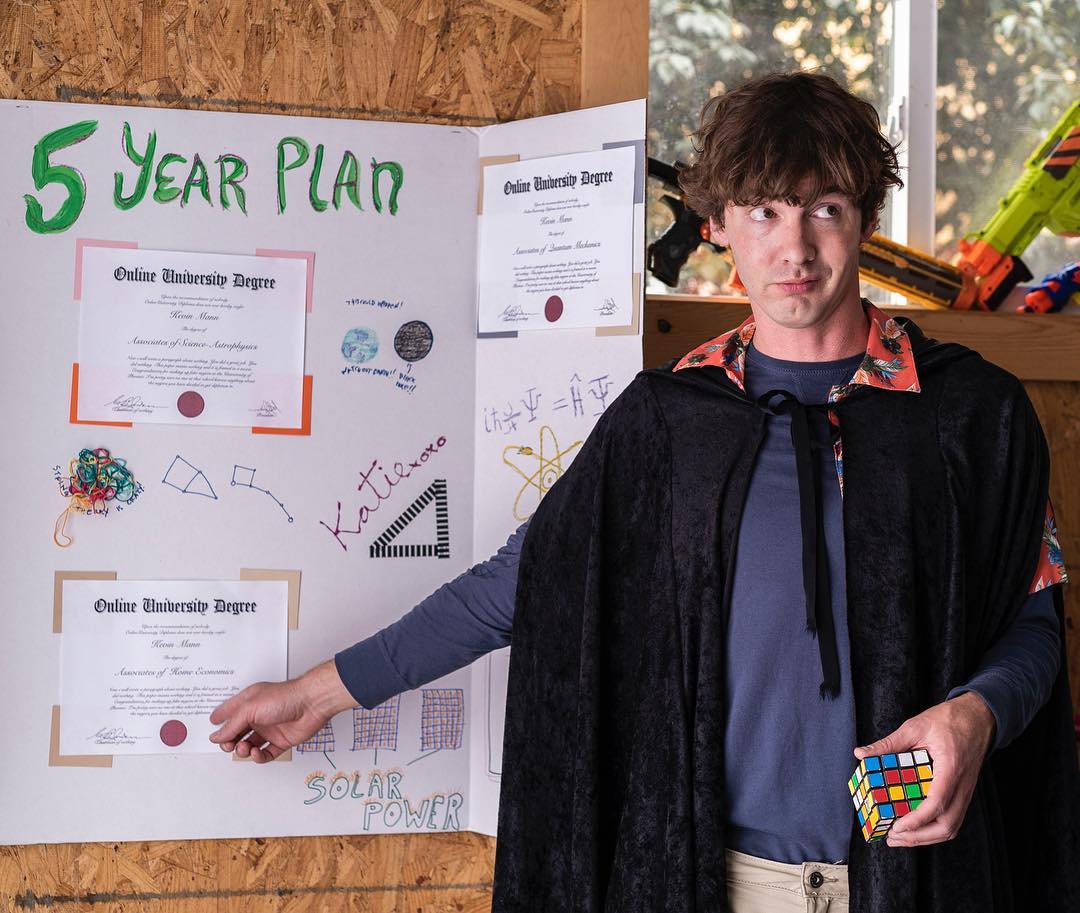Daddy Issues, by Bob Connally
24 Apr

David Zucker (one of the comedy geniuses behind Airplane! and The Naked Gun) stated in his “15 Rules of Comedy” that, “Two jokes at the same time cancel each other out. When an actor delivers a punchline, it should be done seriously. It dilutes the comedy to try to be funny on top of it. Likewise, if there is something silly going on in the background, the foreground action must be free of jokes and vice-versa.” There’s a scene about halfway through Man Camp where some of our characters find themselves in a bar fight that violates this very rule. The fight in the background is played for laughs as a couple other characters have a conversation that is also meant to be funny. It’s not that these are strict laws that must be adhered to, and if something works, then it works. But when you’re making your directorial debut with a broad comedy, you would do well to heed the advice of David Zucker. Unfortunately, first time director Nate Bakke did not.
Written by co-stars Daniel Cummings and Scott Kruse, along with More Than One Lesson’s own Josh Long, Man Camp is the story of three adult brothers who idolize their father who died of cancer 12 years earlier. Adam (Cummings) is married with a young child, while Tim (Kruse) is a college student who defines frat boy. Their youngest brother Kevin (Erik Stocklin) is accumulating worthless college degrees while living with their mother Theresa (Tammy Kaitz). Kevin is utterly obsessed with fantasy role-playing games and has little grasp on reality. Every year around the anniversary of their father’s death, the three of them go out to their family vacation home for a weekend of “man camp.” They remember their dad as the ultimate man’s man. The kind of guy who feared nothing, did everything with flair, and whose every utterance was filled with wisdom.
When they arrive, they are shocked to not only find their mother there but a man named Alan (Pete Gardner) who is clearly with her for a romantic getaway. Adam and Tim (especially Tim) are incensed at the idea that their mother would be involved with anyone who isn’t their dad, particularly in this house. Kevin meanwhile, is already aware of their relationship and has actually taken a shine to Alan. Being the youngest, Kevin’s memories of their dad aren’t as strong so he’s naturally a little more open to the idea.
This early part of the film is hit and miss. The broad style of comedy is on full display through most scenes and moments work here and there but the real issues begin once Alan is introduced. The problem isn’t Alan himself (Gardner’s performance is the best thing about the movie) but how the other characters react to him and their subsequent choices. Tim is bent on removing Alan from their mom’s life by any means necessary, even to the point of getting him killed in the woods, while Adam wants Alan gone but draws the line at murder. Inexplicably, Theresa is agreeable to Tim’s plan for her to go home so the boys can spend the weekend alone with Alan, despite her knowing her sons well enough to know that no good could possibly come of it. This is the first big instance of “so the movie can happen” logic that pops up several times throughout Man Camp.
The real meat of the film involves Adam and Tim doing horrible things to Alan while Kevin feels conflicted. While it’s certainly believable that these brothers would have difficulty accepting a new love in their mom’s life, it never feels believable that Adam would go along with Tim’s outrageous schemes. He protests a number of times but he ultimately goes along with the ludicrous ideas Tim comes up with, each more dangerous than the last. It just makes Adam inconsistent and Tim completely unlikeable. Kevin may be the most disconnected from reality of the three but in his way he’s the most mature. He at least doesn’t want to hurt anyone and he’s the only one who ever sticks up for Alan.
For his part, Alan is a bit of a Ned Flandersy doofus but he is such a warm and likeable person that the audience can’t help but be on his side. We also get scenes that show some real depth and that there’s more to him than his awkward exterior. When he’s seriously injured by Adam and Tim’s cruel pranks it’s not funny because he has all of our sympathy and we have none for the two older brothers. Meanwhile, a scene where Alan accidentally shoots horrifically painful bear spray into Adam’s face is hilarious because it’s done completely without malice and by a man who has no idea what he’s doing in the great outdoors. As broad as this scene is, in the context of the movie it feels entirely believable. It’s a moment that would have fit very well into a movie where Adam and Tim were more sympathetic characters whose actions weren’t borderline cartoonish.
Man Camp ends up being an occasionally funny but pretty mediocre comedy with one performance worthy of a better film. The aforementioned “so the movie can happen” logic ends up dragging down the film’s final act. It’s immediately obvious to any viewer paying attention what the truth is when we get to the big game changing scene, but Man Camp insists on taking us through the lengthy paces to get there so, well, the movie can happen.
No one can ask a first time filmmaker with a small budget to make a comedy as well-crafted and funny as Airplane! That wouldn’t be fair. But it’s not unreasonable for us to ask that filmmaker to listen at least listen to the person who made Airplane! Surely, there’s a lot he could learn.



No comments yet